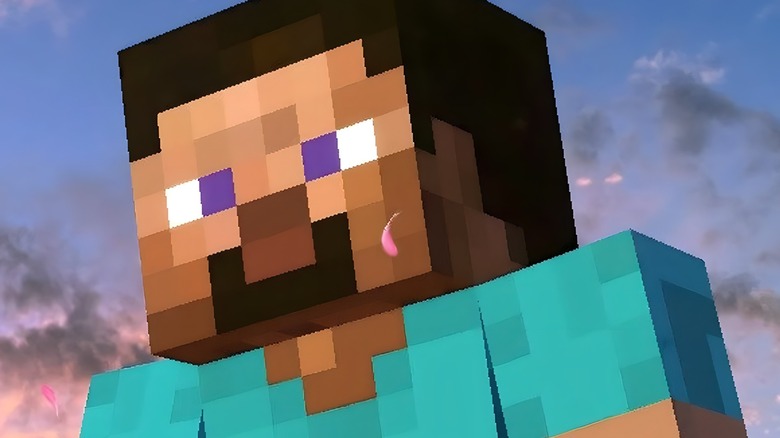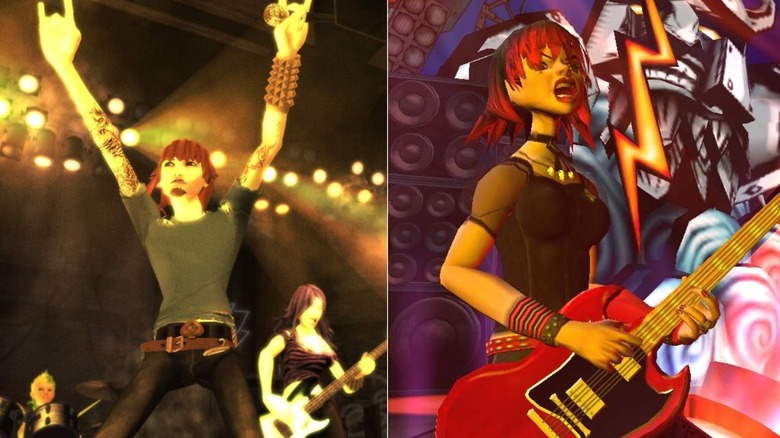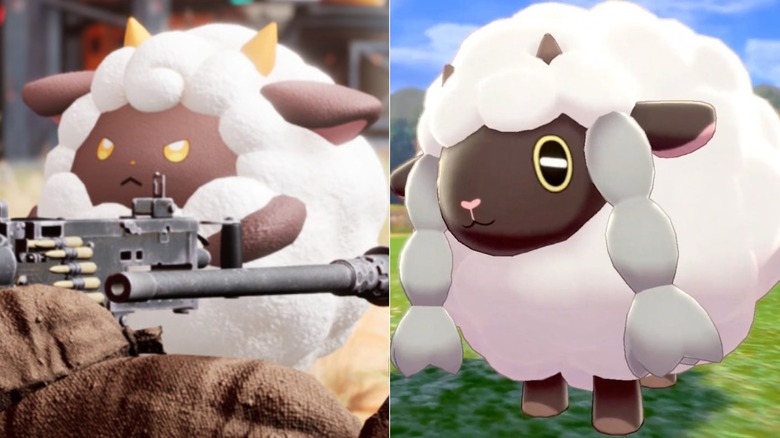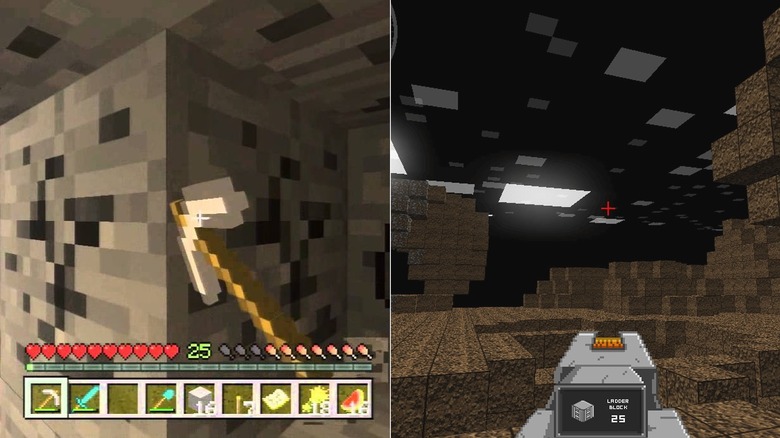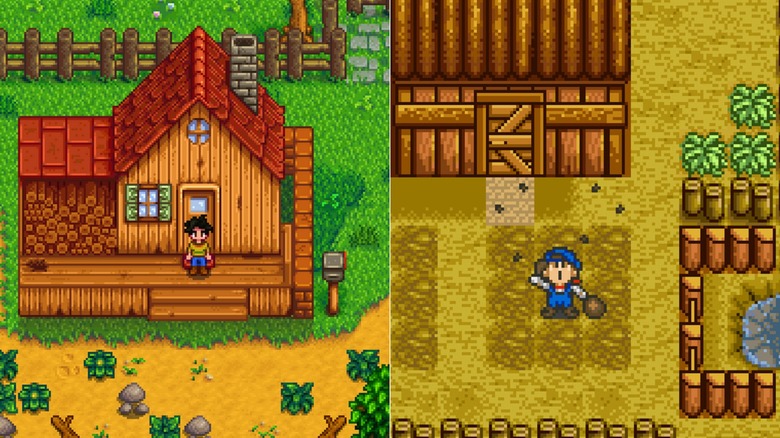Video Game Clones That Are Better Than The Original
It's pretty much impossible to create anything in a vacuum. There's just so much media being produced at all times; even a brand new IP is bound to have something in common with its peers. Some video games end up resembling other titles by way of parallel thinking, while others are knowing tributes or outright clones of other works. However, it's worth noting that "clone" doesn't have to be a derogatory term in every case.
In some cases, the developers behind video game clones didn't set out to straight-up rip off their contemporaries. Many clones are affectionate tributes that pay a bit of respect to the thing they're actively copying or parodying, while others use the skeleton of a popular work to forge their own path, creating something that feels at once familiar and fresh. The following games are clone titles that have been embraced by the public, becoming major successes and sometimes even eclipsing their inspirations in the eyes of gamers.
Rock Band rocked harder than Guitar Hero
You really had to be there for the plastic guitar boom of the mid-2000s. "Guitar Hero" had kids learning songs by Queens of the Stone Age and Blue Öyster Cult, mashing buttons and strumming as fast as their fingers could manage. The 2005 game was a smash hit, spawning multiple sequels and a 2007 imitator that upped the ante — an imitator developed by the same folks who made "Guitar Hero." After development of "Guitar Hero" was handed over to Neversoft following the first two games, original developer Harmonix began work on "Rock Band." Expanding from a single guitar to a whole set of instruments and a mic for aspiring vocalists, "Rock Band" also encouraged a much more communal approach to virtual jamming. Sure, "Guitar Hero" had a two-player mode, but "Rock Band" made you and your buddies feel like you were in a ... well, a rock band.
Comparisons were wholly inevitable, with Forbes calling "Rock Band" "a shameless knockoff of 'Guitar Hero'" (via VG247). Thankfully, the game ended up being so much more than that. "Rock Band" was released to positive reviews and huge sales figures. At one point, EA was concerned that the company wouldn't be able to produce enough copies of the game to meet holiday shopping demands. The parent series quickly took notes (no pun intended), with "Guitar Hero" expanding to more instruments in later games.
Palworld captures more players than recent Pokémon games
No one is discounting the influence and popularity of "Pokémon." It's a truly revolutionary franchise, and the earlier entries in the series are still considered among the greatest video games of all time. However, newer releases in the franchise have left players wishing that Game Freak and Nintendo would take more risks with the beloved series. "Palworld" has stepped in to do just that.
"Palworld" has also proven to be one of the more controversial indie games in recent history. Though some have accused the "Pokémon with guns" open-world title of stealing ideas and assets from the beloved monster-catching franchise, defenders of "Palworld" developer Pocketpair have maintained that this game is more of a loving homage. While it's true that some of the creature designs may veer wildly close to recognizable Pokémon, "Palworld" really uses the former's capture-and-battle mechanics as a starting point for a base-building and resource-gathering survival game.
Reviews for the game have been mostly glowing, noting that "Palworld" has just as much in common with the likes of "Fortnite" and "Rust" as it does with "Pokémon." Some longtime fans of the "Pokémon" franchise have even argued that "Palworld" exceeds recent official "Pokémon" games in terms of quality. Though it's still being expanded while in early access, the game's survival mechanics already allow players to do so much more than some of the more narrow-minded mainline "Pokémon" entries. It's still difficult to top the Game Freak franchise's early years, but it seems "Palworld" is scratching an itch that "Pokémon Scarlet" and "Violet" simply did not. For a large number of players, "Palworld" has surpassed the series it set out to imitate.
Minecraft started as an Infiniminer clone project
Zachtronics' "Infiniminer" is a game in which a spelunking player character must hunt through a block-based environment for crafting materials and to build new structures — and all of it is rendered in a quirky, pixelated art style. If you think that sounds a whole heck of a lot like "Minecraft," boy, do we have news for you.
"Minecraft" began life as a zombie game with the working title of "RubyDung." Though creator Markuss "Notch" Persson was enjoying his time tinkering with it, the project wasn't quite coming together. Inspiration struck when Persson encountered "Infiniminer" for the first time. Persson explained in a blog post, "I found 'Infiniminer.' My god, I realized that that was the game I wanted to do." As Persson continued development, he posted clips of his in-progress work, directly referring to the project as "an 'Infiniminer' clone I'm working on" (per GameByte). Persson also added touches of his own, including more role-playing mechanics and a fantasy-oriented tone. This clone game eventually evolved into the base version of "Minecraft," and the rest is gaming history. Since then, "Minecraft" has expanded to be very much its own entity, with story mode spinoffs and even a big Hollywood movie on the way.
As explained by "Infiniminer" creator Zach Barth in his book "ZACH-LIKE," "I believe that 'Minecraft' is a very different game that I would never have made, but on the other hand it's obvious how 'Infiniminer' directly inspired 'Minecraft,' which makes it easy to conflate the two, especially when other people treated me like I'd somehow been wronged." These feelings were somewhat exacerbated by the fact that "Minecraft" went on to earn billions of dollars. However, Barth added, "Weirdly, I'm kind of proud of it now."
Stardew Valley reaped the best parts of Harvest Moon
"What if 'Harvest Moon' could go on forever?" That was essentially the thought process behind Eric "ConcernedApe" Barone's creation of "Stardew Valley," a slice-of-life farming sim that has pretty much eclipsed the series that inspired it. The solo developer has explained that he was inspired to create his own "Harvest Moon"/"Story of Seasons" clone because of what he saw as a declining level of quality in the series. Specifically, Barone felt that more recent entries had become too repetitive and similar to one another, with too much of a rigid focus on farming. Additionally, he wanted a game that continued on past the usual time limit of a "Harvest Moon" title. To this end, Barone developed a game in which characters can live whole virtual lives. "My idea with 'Stardew Valley' was to address the problems I had with 'Harvest Moon,' as well as create more 'purpose' with tried-and-true gameplay elements such as crafting and quests," he explained in an interview with Gamasutra.
Barone did just that, creating a game that proudly wears its influences on its sleeve, yet has a bit more of a modern flavor in its execution. He also turned to fellow gamers, asking "Harvest Moon" fans on social media to chime in with features they'd always wanted to see in a life sim. To this day, ConcernedApe continues to update the game with new locations, items, and gameplay modes, making it the everlasting experience that "Harvest Moon" could only dream of being.

